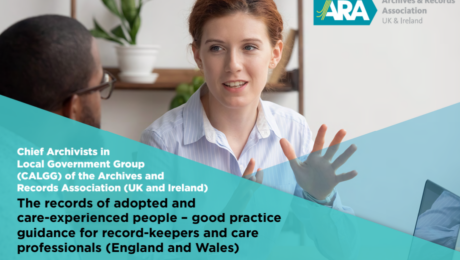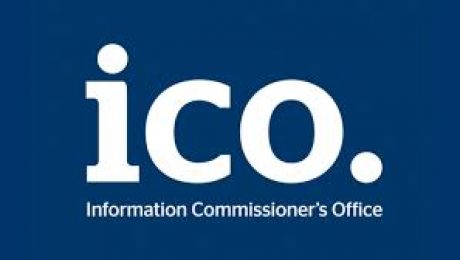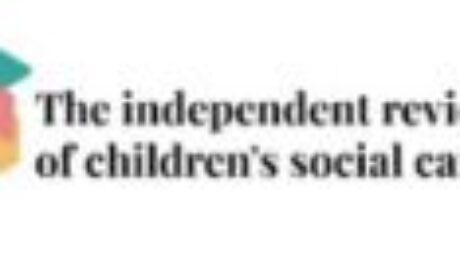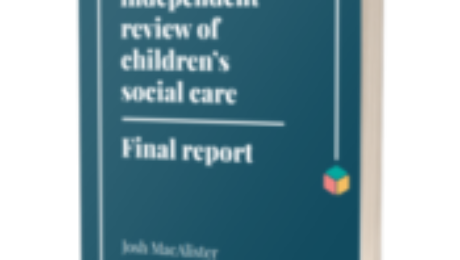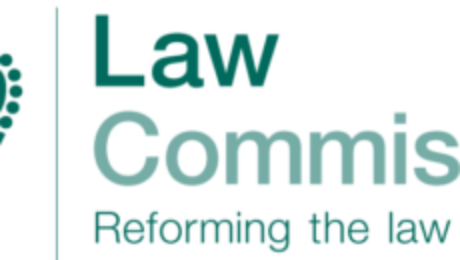Archives & Records Association launch new paper on the need for better access to records for care leavers.
Today marks the launch and publication of a new paper on better access to records for care leavers and the adopted. It is the result of a project lasting from November 2022 to March 2024, endorsed by a member of our association, Baroness Lola Young. Some members of our committee will be attending in eager anticipation of the launch in London at Bevin Hall, close to the Houses of Parliament. Three of our committee members, Dr.Julia Feast OBE, Dr. Jim Goddard and Isa Jaye contributed to the project personally.
To quote the introduction to the project:-
The guidance has been created as part of a project led by members of the Chief Archivists in Local Government Group (CALGG) who are part of the Archives and Records Association (United Kingdom and Ireland). An Advisory Group consisting of adopted and care experienced people, social work practitioners, and information/ data protection practitioners has guided the project …. Funding was received from The National Archives, the Welsh Government and from CALGG members.
The report is divided into several parts
- Creating records
- Managing and preserving records
- Providing access to records
- Summary of statutory guidance and minimum standards
It is argued that there should be parity between adoption records, and care records in that there is no statutory rule as to how long records should be preserved for those care leavers who have not been adopted. A fixed period of between 125 and 150 years is proposed, in order to last beyond the lifetime of most, and give the relatives of any deceased some clue as to their parents life, if indeed they are to be permitted to have access. The difficulties with access to records by the relatives of the deceased is highlighted
Mention is made of ensuring that if digitised, continued access to whatever format is used should be made possible both backwards and forwards in time. Tracking records centrally is recommended so that their location many years thereafter is not lost with time. Historically this has often been a problem, particularly during devolution of local authorities years ago, and the re-organisation of boundaries.
Examples of good and exemplary policy under all headings is conveniently given.
The old chestnut of redaction, and the need to keep it to a minimum for care-experienced people is underlined once again. The clamour for secrecy and ever increasing efforts to hide personal data from the prying eyes of the public/media works against the needs of the care leaver/adopted person to know about their personal history in detail.
The trauma involved in reading one’s records for the first time in detail is covered with recommendations for trauma training by those supervising access. The worst policy of a box of disorganised bits of paper is hopefully a thing of the past.
Finally, to quote Baroness Young
The CALGG led project has brought into sharp focus the necessity to ensure the longevity and preservation of these unique archives of care experienced and adopted people. We can think of these records as being very personal, because of course they are. But they are also of wider historical significance and an invaluable resource. They give texture to the story of society’s attempts to provide substitute families in circumstances where birth parents are not able to provide a nurturing, secure environment for their children.
To access a copy of the full report, click here
- Published in General, Press Releases
ICO calls for people to share experiences accessing care records as it vows to improve support
The Information Commissioner’s Office (ICO) is calling on people with experience of the care system in the UK to share the challenges they have faced when accessing their care records from organisations.
With a survey launched today, the UK data protection regulator is committing to improving the support it provides to both people with care experience and the organisations that hold their information.
The ICO recognises that records of personal information are especially important to people who have care experience, often revealing elements of their childhood history which they cannot recall. Under data protection law, everyone has rights over their own personal information. This includes the right to ask for this information using a subject access request (SAR) but for people with care experience, this can be a lengthy and stressful process.
Last year, the ICO ran workshops with organisations who support people with experience in the care system. The workshops identified that accessing care records is a significant issue with long delays, heavily redacted records and challenges accessing support. The insight revealed that organisations can
struggle to understand what information they can release from complex records and often fail to treat these requests with the sensitivity they require.
It also highlighted that the regulator could do more to help people with care experience obtain their personal information and exercise other information rights, as well as support organisations to provide timely responses. In response to the concerns raised, the ICO is now urging people with care experience in the UK to come forward to share their experiences, both requesting their records and having their personal information handled in the care system.
The information gathered about the impact of delays, redactions and other concerns will help the ICO identify areas where it can focus its support.
Catherine Evans O’Brien, Head of Communities at the ICO, said: “Accessing care records can be an emotive and personal subject, as the information can play a huge role in helping someone to understand their identity. As the UK data protection regulator, we want to empower people to exercise their rights over their own personal information and we want to improve the support and resources we provide to help people understand these rights.
“This survey is a major step towards improving the experience of accessing personal information for people who have been in the care system. As well as experiences trying to access records, we want to hear about any concerns people have about how their personal information has been used, so we can
understand where we can make the most difference with our support.”
“This survey is a major step towards improving the experience of accessing personal information for people who have been in the care system. As well as experiences trying to access records, we want to hear about any concerns people have about how their personal information has been used, so we can
understand where we can make the most difference with our support.”
The ICO has also been engaging directly with local authorities in Scotland to improve response times where it has identified poor performance handling requests for care records. In Scotland, many local authorities have seen an increase in SARs, especially since the Redress Scheme requires people to provide
care records when applying for redress for abuse suffered while in care.
Jenny Brotchie, Regional Manager for Scotland at the ICO, said:
“We have heard how undue delays and other challenges accessing care records can cause further trauma for people in Scotland. Organisations must get this right which is why we are closely monitoring local authorities until we are satisfied that their compliance has significantly improved.”
Using the insight gathered from both workshops and the survey, the ICO will produce updated resources for all UK organisations, providing clarity on how they can improve their processes when handling requests for care records and protect the personal information of people with care experience.
If you have experience accessing your care records, please share details with the ICO please share details with the ICO here.
You can read more about the ICO’s work with local authorities in Scotland here.
Find out more about your information rights on the ICO’s website.
- Published in General, Press Releases
“Disappointing” Response by Home Office to Report of Independent Inquiry into Child Sexual Abuse
The Independent Inquiry into Child Sexual Abuse (“IICSA”) published its final report with 20 Recommendations on 22nd October 2022. The Inquiry opened in 2015. The report was the culmination of 725 witnesses during 325 days of public hearings, hearing from over 6,000 victims and survivors of child sexual abuse, and the contents of 52 separate reports. The report was therefore well researched and evidenced, and was not a hurried summary on the back of a cigarette packet.
The Response of the Home Office to the Report
IICSA was firm in its insistence that the Government respond within 6 months. In April this year, the government explained that due to the Local Elections it would not be able to respond until May. The Response was finally published on 22nd May 2023. To read the full response click here
The report adopts 18 out of the 20 recommendations, but some of the responses are firmer than others. Whereas a firm commitment to bring in changes is made in relation to some recommendations, consultations with a commitment are made in relation to others. I have copied and pasted the table appearing in the report below
Access to Care Records (IICSA Report)
IICSA’s Report was very helpful in that it made exactly the type of recommendations that we have been advocating in the Campaign Group namely minimal redaction, avoid over-cautious deletion of 3rd Party data, provide support to Care Leavers when accessing their records, adhere to the statutory time limits if possible for disclosure, introduce legislation to make the retention of care records 75 years etc.
Home Office Reaction
The reaction of the Home Office was disappointing in that it agreed with the recommendation, but then passed the buck to the Information Commissioner’s Office (“ICO”) to provide enhanced guidance.
To be fair we were promised, as a Group, enhanced guidance some years ago at a meeting at the MIRRA Symposium to which the then head of the ICO, Elizabeth Denham CBE gave a Keynote Speech.
This is an extract from the recommendation
| 17 | A code of practice for access to records pertaining to child sexual abuse. | We accept the importance of access to records. We will engage with the Information Commissioner’s Office on implementing this recommendation |
Legislation Needed
Nonetheless there was no mention of the proposed legislation we suggested as long ago as 2013 in the House of Lords –
It shall be a defence to any allegation of unlawful disclosure of data under the Data Protection Act by the data controller, if it can be shown that the data controller has made a reasonable examination of the data and has satisfied himself as to the need to disclose data and identities of individuals whose consent has not been obtained under section 7(4) of the Act having regard to the needs of the care leaver as set out elsewhere in this Act.
Hansard 14th October 2013
We discovered, when conducting round tables with different Local Authorities that there was widespread disagreement about what should, and should not be redacted from Care Records before disclosure to a Care Leaver, with some taking a liberal, and others taking a cautious approach.
- Published in General
ICO takes action against 7 Organisations
Action has been taken against SEVEN organisations who failed in their duty to respond to information access requests.
The Information Commissioner’s Office (ICO) has taken action against seven organisations who have failed to respond to the public when asked for personal information held about them, known as a Subject Access Request (SAR).
To read the story on the ICO website and find out which organisations were at fault click this link.
- Published in General
ACRCG commentary on the Care Review: a missed opportunity?
The Department for Education set up in July 2022 a National Implementation Board as part of the government’s response to the Care Review. At the time of writing this post, the current Prime Minister has not appointed a children’s minister but we assume this person will chair the Board. The Children’s Commissioner, together with the current president of the Association of Directors of Children’s Services, are included among the board members. The DfE has said that the board will have three additional members with direct experience of the care system, to be appointed ahead of the first full meeting in the autumn. Josh MacAlister has been given a contract to advise on the implementation of the review that he led as Chair. The previous administration said it would report on implementation proposals before the end of the year: however, it is possible that will now slip over into 2023.
Our colleagues in the Care Leavers Association (CLA) have commented on the review and we endorse their views. CLA says whilst welcoming that the review proposes the right to support for care leavers accessing their care files should be lifelong, this should not been seen through the lens of mental health issues alone. The right of care leavers to have access to their care records must sit alongside a life long duty on local authorities to deliver lifelong care for their population of care experienced adults.
The Care Review Report at p173 discusses the issue under the heading ‘Provision of Mental Health Support to Care Leavers over 25 Accessing their Care Files’. Both ACRCG and CLA strongly believe that post care support should not be restricted to ‘mental health’ concerns, with its potential for stigmatising care leavers. In our experience, in the vast majority of situations, adult care leavers simply need advice, follow-up support and guidance that is unrelated to any mental health issues. In fact, mental health should not be listed as a reason for providing support as it reinforces negative pathways to access support services and, in effect, directs the care leaver away from the local authority and into health services.
There are many more issues – for example, searching for knowledge about family connections,
identity and simple fact-finding – that merit support far more than alleged mental health concerns.
Such concerns have, historically, been used as a reason for to deny or restrict access to case
records either completely or to justify severe and unnecessary redaction. This ‘stereotyping’ of care
experienced adults who have the legal right to find out what personal data about them is on care
records is at best unhelpful and, at worst, yet another way of marginalising the rights of care
leavers.
What is actually required?
The 2014 revision of the Children Act 1989 guidance and regulations (Vol.3: planning transition to adulthood for care leavers’) makes clear (pp.37-43) what care leavers up to the age of 25 can expect and are entitled to. At the heart of this guidance is the clear message that “local authorities should provide services that consider the welfare of the care leaver, taking into account the implications of the decisions and actions for the care leaver and anyone else involved.” (p.39). But this guidance has its limitations.
ACRCG working with the CLA was instrumental in achieving a significant revision to the guidance and, at the time, was disappointed that, for legal reasons – this revision arising from amendments to children’s legislation – such guidance could not be extended to care leavers over the age of 25. However, the document clearly expects “the principles of good practice on accessing records to apply to any care leaver regardless of age”. In our experience, local authorities seem to be unaware of this guidance and, likewise, Ofsted does not see this as a performance standard when inspecting local authority practice and compliance.
So what does ACRCG and CLA say is now required? We believe that the Care Review missed an opportunity to recommend that the statutory guidance should be the basis for adult legislation that puts support in accessing care records at the heart of the duty on a local authority to set out its lifelong support offer. This support is so much more than a ‘mental health’ issue.
Alongside this, guidance should address the issue of the redaction of care records, which arises from the records coming within the remit of data protection legislation. This legislation has been helpful in ensuring access in recent decades. However, it is unsuited to the complex nature of care files. Frequent – and frequently excessive – redaction of data on care files causes delay in releasing data and a great deal of unnecessary distress to many care experience people seeking to make sense of their background, identity and experiences in care. These fundamental needs are far more important to the majority of care experienced adults who want access to their files.
The Care Review did not address the failure of local authorities to address the Article 8 rights of care experienced adults. Local authorities do not give sufficient weight to their legal duty under Article 8 of the Human Rights Act 1998 to ensure that decisions made when replying to a Subject Access Request [SAR] properly take into account the right of respect to family life that the person making the SAR has. Too much weight is given to third party privacy rights and local authorities too often exercise their discretion to share information without consent in a way that does not address the rights of the care experienced adult.
What is needed now?
For this reason, ACRCG and CLA are seeking firstly an amendment to current data protection laws to create a ‘defence’ of ‘justifiable and reasonable’ sharing of personal data without the consent of the person to whom the data belongs. Secondly, we continue to argue that there is a responsibility on the State to legislate for dedicated access rights together with guaranteed support consistent with the role the State had when it intervened in that person’s family life creating a life long alteration to their family life and their family connections.
- Published in General
Briefing Document jointly compiled by ACRCG & Care Leavers Association for Experts by Experience
The Care Leavers Association and the Access to Care Records Campaign Group worked together on a briefing document for the Board of the Experts by Experience members about the problems and impact of the current ‘care-less’ system when a care experienced adult asks a local authority for information from their care records. The members of this Board are tasked with ensuring that the Chair of the Care Review, Josh McAllister, takes into account throughout the enquiry and in its findings, the lived experiences of children, young people and care experienced adults.
The link to this group is here
Our briefing document is here
- Published in General
ACRCG Response to Law Commission
ACRCG says the law does not work for adult care leavers asking for their care records.
We have made a submission to the Law Commission’s 14th Programme highlighting the need to change the present law.
The Law Commission will decide what to include in its programme in early 2022
Our submissions is available on our Resources Page here
The Law Commission is an independent body which reviews current law and make recommendations for improvements and reform to Parliament. It is considering whether to include in its 14th programme a review of the law about identity and the barriers people experience when trying to find out about their origins and family connections.
- Published in General
Darren Coyne (1972 – 2021)
We are deeply sad to announce that Darren Coyne, an irreplaceable founder member of the ACRCG, has unexpectedly died on 25 May 2021.
Darren was a fearless activist and passionate about improving the rights of adult care leavers to know about their time in care and their family connections. He worked tirelessly to identify and overcome the deficits, barriers and ‘carelessness’ of the system and its impact on persons asking to see their care records.
He was passionate in speaking out about the misuse and misunderstandings of data protection laws to deny people their right to know their family connections There are many care leavers who will have known Darren because of the support he gave them when, sometimes in very difficult and challenging circumstances, they had asked to see their care files, working with them to make ‘narrative sense’ of their time in care.
Darren spoke passionately and lucidly to everyone about the impact that being denied knowledge and memories of time in the care system had on his own and other people’s life journeys. He spoke persuasively to policy and law makers, academics, prison governors, local authority and voluntary sector case workers preparing files: he spoke at conferences, he worked with colleagues in research projects, he organised seminars and workshops, he went to where people needed his assistance, his advocacy and his knowledge. He went way beyond doing this work as a
‘job’: it was his mission. And, central to his mission, was the principle of working in partnership with all care leavers, giving emotional and mentoring support. The Care Leavers Association has lost a valuable colleague.
Recently, Darren made a podcast with John-George Nicholson for Research in Practice: we uploaded it to our website. Please take time to listen to Darren and John-George: it tells us so much about the experiences of care leavers reading their case records so succinctly.
We owe it now to Darren to keep steady in our advocacy work with care leavers to establish a much fairer framework of their rights to their family story. That is what Darren would expect us to do: to go forward fearlessly.
We offer our condolences to his daughter, his family and friends and to care leavers who have lost a true supporter and advocate and to his colleagues at Care Leavers Association and colleagues in the various projects Darren was involved with.
- Published in General
ACRCG makes a submission to the Joint Committee on Human Rights
The UK Governmen,t as promised in its most recent election Manifesto, has set up a Review of the Human Rights Act. Its focus is how does the Act work in courtrooms, and the relationship between government, parliament and the courts.
At the same time, Parliament’s Joint Committee on Human Rights called for brief evidence from across the sector to highlight ‘everyday ways’ in which the HRA has been helpful in pushing forward the rights of citizens. We believe that Article 8 which requires public bodies to respect family life is an important right for adult care leavers.
The Access to Records Campaign Croup’s submission to the Joint Committee is set out below. We agreed that the Committee can publish our submission and send it as evidence to the Independent Review.
We want our contribution to push forward on the campaign to get specific legislation outside of the current data protection law to ensure that the rights of adult care leavers to knowledge about their time in care and their family connections are properly acknowledged.
Submission to JCHR on behalf of the Access to Care Records Campaign Group
Who we are
The Access to Care Records Campaign Group works alongside adult care leavers who are seeking to make sense of fragmented memories of growing up in the care of the State. Currently, the only way an adult care leaver can get a copy of their case records is by making a Subject Access Request under the Data Protection Act 2018. For many adult care leavers this process is not an effective way of getting information about their family and their time in State care.
Why we are making a submission
We see no sound reason to alter the Human Rights Act 1998. The Act [HRA] is and must continue to be a central legal resource for individuals marginalised by the State to redress the imbalance in power between them and the State and the consequence of its actions which have life long impact on their identity and their understanding of their origins. It is essential that the courts continue to have the power to rectify actions by public authorities which fali to take into account their duties under the HRA.
Why Articles 6 and 8 are important to adult care leavers
Whilst the Data Protection Act 2018 may, if files have not been carelessly lost or damaged or in fact have few details, enable the adult care leaver to have information about themselves from their case records, often local authorities and other care organisations, are reluctant to exercise their discretion to provide third party information from these records without consent. This defensive practice means that an adult care leaver is too often not able to make narrative sense of who they are and who their family consists of. This clash between the dual rights of respect for an individual’s privacy and the rights of the adult care leaver to know about their family life results in an outcome where much of the key information they are seeking is redacted. There is limited recourse to the Information Commissioner’s Office. The court is, however, the last resort for enforcing rights and Article 6 and Article 8 are key rights for a person who has been removed from their family of origin into the care of the State. And, too often, the State has been a ‘care-less’ parent.
Working with adult care leavers seeking their care records
Social workers and other child welfare professionals embrace the HRA as it enables them to ensure best practice in respecting the rights of an individual and their rights to experience family life and fair process. They know and welcome that they are accountable to the courts for ensuring a rights based professional practice when, at times, the interests of bureaucratic structures within a public authority tend to march in contradiction to the standards of their professional practice. The HRA is a significant and powerful force for reinforcing a practice culture of respect for human rights. Its enforcement at every level in the justice system is critical.
The structure and philosophy of the HRA and its mechanism of enforcement is a powerful tool for advocacy whilst working in partnership with adult care leavers who are consistently marginalised by the system which had responsibility for their care when they were children and young people. Section 3 of the HRA is critical to ensuring the overarching impact of a rights based approach to the interpretation of all legislation, including the Data Protection Act 2018 as well as social care legislation.
Deficits in the independent Review Enquiry
We are submitting this response to the Joint Committee on Human Rights because we consider that the Terms of Reference and the questions of the Review Enquiry are drawn too narrowly to enable campaigning and community advocacy groups to set out effectively how important and central this Act has been to our practice during the 20 years since its implementation. The focus of the current Review is about how the courts have interpreted and implemented the HRA.
What Access to Care Records Campaign Group wants
ACRCG is seeking to achieve legislation which takes the rights of an adult care leaver to their personal and family history outside of data protection legislation and process and replaces the present legal route with a dedicated and more empathetic legislative framework which addresses their unique experiences and rights to knowledge about their family life. For campaigning groups such as ours, the HRA is coherent and effective legislation and a key tenet of partnership with marginalised adult care leavers seeking redress from too frequently the neglectful care of the State.
- Published in General

